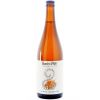Garden Path Fermentation - The Garden Paths Led to Flowered
-
ABV:
7.3% -
Bottle Size:
750-ml -
Serving Temperature:
42–48° F -
Suggested Glassware:
Tulip, Chalice, Small Nonic or Chardonnay Glass
Garden Path Fermentation’s The Garden Paths Led to Flowered is a deftly executed hoppy blonde ale brewed with local Skagit Valley ingredients and the brewery’s house culture of native Saccharomyces. It combines two batches fermented together in a open-top foeder for their primary ferment, then split to be aged in either an oak puncheon or stainless steel, before being re-blended to taste. Inspired by dry, delicately bitter Belgian ales like Brouwerij De Ranke’s XX Bitter, this beer’s brewed with Skagit Valley Malting pilsner malt and white wheat, and dry-hopped with Willamette and Cashmere hops from Yakima Chief Hops. Like all Garden Path beers, it has seen only a slight degree of distribution, predominantly concentrated in Washington. Our Rare Beer Club members will get first access to the upcoming release of Led to Flowered.
This hoppy blonde ale from Garden Path pours a lightly hazy, honeyed yellow color, capped by a dense white foam that leaves intricate lacing. It looks like rich, honeyed saison, and the generous peppery aromatics present themselves immediately alongside that herbal, mineral, and grassy impact of hops. This is nuanced, noble-like hop character, focused on floral and earthy notes, and there’s most definitely a garden-like essense from the outset: like fresh-cut flowers, plus a stroll by the herb garden. This is lush—that’s clear as soon as this is poured.
This certainly nails the dry and delicately bitter goal, but also provides whole extra layers of complexity courtesy of the oak aging and native Saccharomyces yeast. There’s just a ton to enjoy with this beer, but first and foremost it’s a brilliantly streamlined hoppy blonde: filled with herbal and grassy hops, and expanded on by the softly bitter pepper and mellow clove phenolics of its yeast. There’s subtle oak, with vanilla and toast. There are waves of evolving bitterness, alongside secondary notes from minerals to pepper, to hints of red fruits. Led to Flowered brings forth a beautifully handled hoppy blonde, uniquely made in Skagit Valley.
The Garden Paths Led to Flowered will be hop-dominant with more Belgian-style yeastiness of the phenolic sort when young, with its native house culture taking on more of a funky and overtly acidic character over time. The brewery suggests enjoying it on the fresh side. With a focus on herbaceous, mineral hops and peppery yeast character, look to pairing options with grilled chicken or lamb, herb-encrusted goat cheeses, or a rich spring-vegetable quiche.
This month we’re pleased to introduce a brewery that will be new to the majority of our Rare Beer Club members but that we’ve been loving the releases from: Garden Path Fermentation up in Skagit Valley, Washington. Garden Path’s beers are bottle conditioned and yeast driven while focused on showcasing the region’s wealth of locally grown ingredients—even making cider, wine, perry and mead from Skagit Valley ingredients. They use 100% native yeast, but specifically cultivated their house culture to focus on native Saccharomyces (the genus that includes most traditional brewer’s yeasts) rather than a pungent or acidic strain. They focus on making balanced, nuanced, drinkable products—uniquely produced in the Skagit Valley.
Founders Ron Extract and Amber Watts may be familiar names to some of you, as both are coming from positions at Jester King Brewery in Austin, Texas. The pair wanted to realize a brewery with their own unique vision at the core, and Skagit Valley has proven to be optimal for them realizing the kind of hyperlocal, native-yeast-driven brewery they wanted to build. Garden Path’s house culture was largely developed with their original lead fermentationist Jason Hansen, who’d come to Garden Path from the illustrious Sante Adairius Rustic Ales in Capitola, California. (He’s since transitioned to a less-rural gig and remains on Garden Path’s advisory board.) What Skagit Valley lacks in proximity it makes up for in many other things, though. The cooler temperatures and lack of summer heat, for instance—highs generally stay below 80—make for great fermentation conditions for a brewery focused on native yeast.
Everything that Garden Path does is typically blended to taste, with batches often separated into different fermentation vessels before being re-blended afterwards. Their emphasis on a native house culture and using open fermentation and oak foeders benefits from the lack of high temperature swings. It also reduces their need for artificial temperature controls. Every edition of a beer is approached as a recreation of a theme rather than a fixed replication, so these beer lines will further develop and evolve as additional editions are brewed. Ultimately, Garden Path Fermentation’s looking to take people in directions they don’t expect to go.
We’ve been loving what we’ve been tasting from Garden Path up in Skagit Valley, and this month we’re excited to bring the brewery’s The Garden Paths Led to Flowered to the Rare Beer Club. This is a hoppy blonde ale conditioned with local blackberry honey and fermented with the brewery’s native house Saccharomyces culture. It’s dry-hopped, aged in oak, and delicious. If you’re up in Washington, Garden Path’s tasting room just opened in April of 2018. They’re just a little over an hour north of Seattle. Learn more about Garden Path at www.gardenpathwa.com.

Unmatched Variety by style, brewery & country
Choose from Five different Beer Clubs offering unmatched variety by brewery,
country of origin, and beer style to suit your specific tastes.


